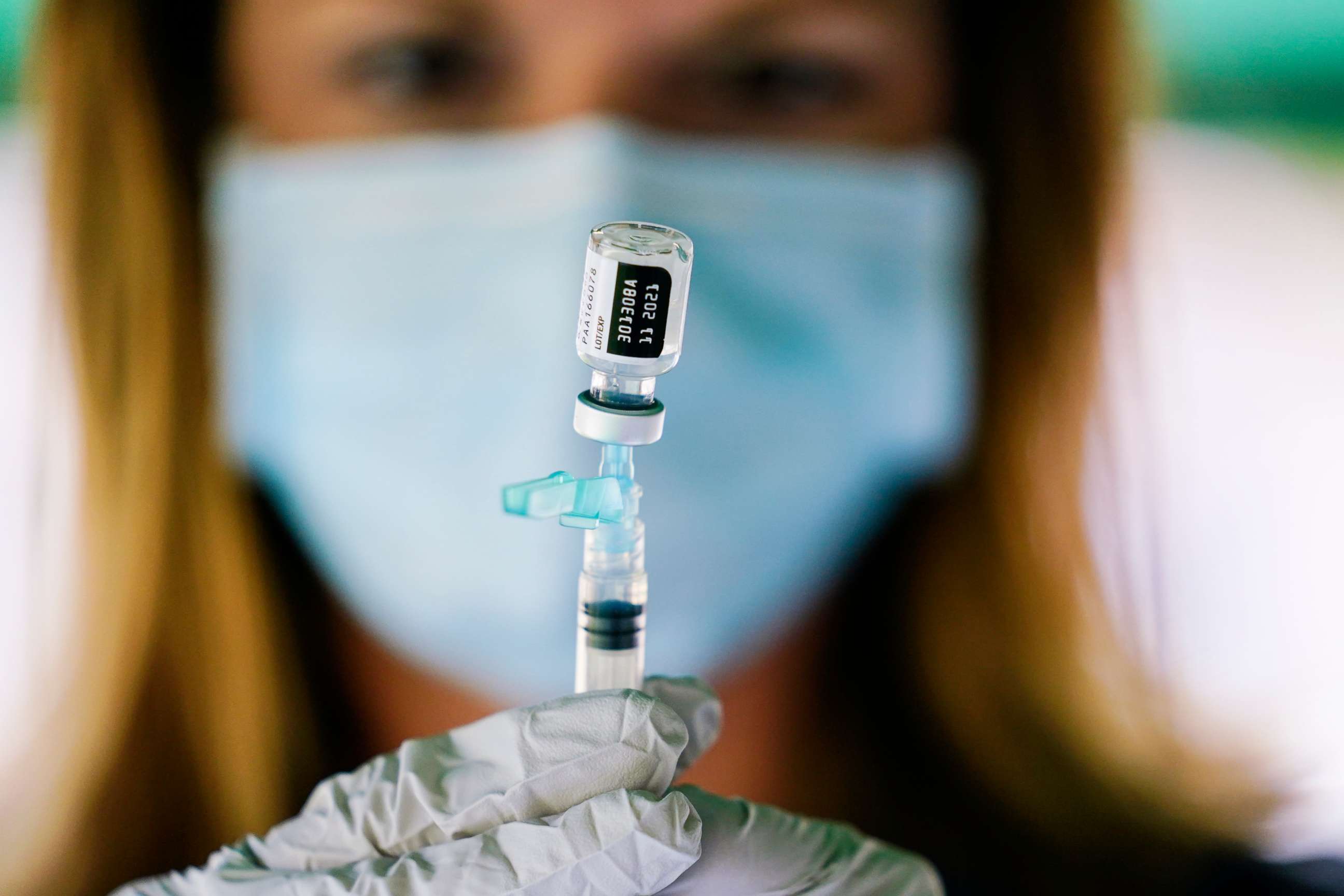New Pfizer data makes case for booster shots 6 months after primary doses
It comes days before the FDA's advisory committee will discuss booster shots.
The Food and Drug Administration on Wednesday released data from Pfizer's application for COVID-19 vaccine booster doses. In it, the company presents what it considers proof that a third shot will be both safe and effective for most adults, arguing that immunity wanes over time and has so far not been linked to any particular variant.
In a 53-page briefing submitted to the FDA, the pharmaceutical company makes the case that it's time to "restore" full protection from the COVID-19 vaccines, even though they are still protecting most vaccinated people from being hospitalized.
The data comes two days ahead of a critical juncture in the COVID-19 vaccine booster approval process: On Friday, the Food and Drug Administration's independent advisory committee is set to hold a public hearing to discuss the latest data on potential booster doses of the Pfizer vaccine.
The committee is then expected to vote on whether a booster dose is safe enough for widespread use -- and whether it's necessary and effective at improving protection levels.
In a review of Pfizer’s data also released Wednesday, the FDA appeared to be noncommittal on the necessity for boosters. The agency pointed out that Pfizer's efficacy data could be hampered by the limitations of studying boosters in real-world situations, which can introduce complicating factors.
"There are many potentially relevant studies, but FDA has not independently reviewed or verified the underlying data or their conclusions," the agency wrote in its briefing.
Still, the upshot of the Pfizer data published Wednesday is that protection against breakthrough infection wanes over time and that a booster brings the immune response back up to a "robust" level.
"These data suggest that a third dose could re-establish the efficacy levels shown one month after two doses, prolong duration of protection, and further increase the breadth of protection," the Pfizer document read.
Pfizer also reported that there were no safety concerns during its clinical trials of booster shots, which followed around 320 participants for up to three months. The FDA, in its review, said the reactions to the booster doses "were not substantially different" from reactions people had to their second shots.
There were no reports of two heart conditions -- myocarditis or pericarditis -- linked to the boosters, even though they have been linked on very rare occasions to mRNA coronavirus vaccines in the days after the second dose, particularly among young men.
Nearly 2 million people in the U.S. have already received boosters, though the approval process for the general public is just getting underway.
In mid-August, the FDA authorized boosters of Moderna and Pfizer for the roughly 7 million immunocompromised Americans who didn't get an optimal immune response to their initial vaccine doses.

And Pfizer/BioNTech, which partnered to develop the nation's first fully approved vaccine, has repeatedly said that booster shots six to 12 months after the second dose will help maintain a high level of protection. Pfizer asked the FDA to approve booster doses of its vaccine in late August by submitting an application and data, which started the process. On Wednesday morning, the FDA made that data public.
While Pfizer's own data shows a decrease from an initial 96% efficacy to 83.7% efficacy after four months, the company also cited data from a study by Kaiser Permanente Southern California, which found that efficacy against infections declined from 88% during the first month after full vaccination to 47% after five months.
But Pfizer acknowledged that U.S. data has yet to show a strong erosion of protection against hospitalization, and instead relied heavily on data from Israel, which is a few months ahead of the U.S. in its vaccine process, to make the case that the U.S. could soon see breakthrough infections that lead to serious illness and hospitalization.
The Israel data cited by Pfizer found that the risk of breakthrough infection was 53% higher for people who received their vaccines earliest in the rollout. The data also found over two times higher risk of breakthrough infection for people vaccinated in January versus people vaccinated four months later, in April.
That Pfizer relied on Israel's data is likely to raise more questions during Friday's FDA advisory committee meeting about whether the U.S. has enough data on its own population to recommend boosters -- a point of division in the booster debate.
But Pfizer also made the point that even waning protection against mild infection is reason to act because it could lead to further spread ahead of the fall and winter flu season.
"Policymakers will need to continue to monitor [vaccine efficacy] over time and may need to consider recommendations for booster doses to restore initial high levels of protection observed early in the vaccination program, and to help control heightened transmission of [delta] as we enter the upcoming fall/winter viral respiratory season," Pfizer wrote.
While votes from the independent members of the FDA's advisory committee, called VRBPAC, are not binding, the agency takes its recommendations under serious advisement in deciding whether to grant vaccines new authorization or approval. While the Biden administration is planning for booster shots to be made available as soon as next week, if and when a recommendation does come to green light booster shots, there are several additional steps before Americans roll up their sleeves for a third time.
First, the FDA would need to formally amend its current vaccine approval for Pfizer. Then, the Centers for Disease Control and Prevention's advisory committee will weigh in as to when to begin administering expanded booster shots and to whom they should be given. The last step is for the CDC director to formally sign off on whether to recommend the vaccine to the public, including who to suggest it for and when.
Pfizer was the first to submit data, but authorization for Moderna and Johnson & Johnson may not be far behind. While J&J has yet to release more information, Moderna on Wednesday said it would request authorization for a booster dose six months after the primary vaccination, based on newly-published data from its Phase 3 trial showing a lower risk of breakthrough infections among people vaccinated eight months ago compared to people vaccinated 13 months ago.
Unlike Pfizer, Moderna’s third booster will be a half-dose. They say their data shows that boosting with a half-shot seems to generate more than enough immune response.
But the process will begin with Pfizer, the first to have all its data in. Friday's FDA meeting comes just days before the Sept. 20 date set by the White House as the target to begin deploying booster shots for a wider pool of Americans.
The question of whether America's immunity is waning has become an urgent question in recent months with the rise of the delta variant as large pockets of the country remain unvaccinated.
FDA acting Commissioner Janet Woodcock and CDC Director Rochelle Walensky -- both White House appointees -- endorsed Biden's Sept. 20 plan.
But it has received some pushback, with health experts criticizing the Sept. 20 boosters-for-all timeline as premature.
Two top FDA officials who are leaving the agency later this year publicly waded into the booster debate on Monday, splitting from the agency and arguing in a scientific journal that it was too soon to give booster shots to the general public since the vaccines still offer strong protection against serious disease.
Both are scheduled to attend Friday's discussion.
"The message that boosting might soon be needed, if not justified by robust data and analysis, could adversely affect confidence in vaccines and undermine messaging about the value of primary vaccination," wrote the officials, who are backed by other worldwide organizations.
For its part, the Biden administration has emphasized that science will lead, that federal regulators will have the final say and that the call for booster shots is motivated by a desire to "stay ahead" of the virus.
"You don't want to find yourself behind playing catch up," Dr. Anthony Fauci, the nation's top infectious disease expert, said when announcing the plan. "Better stay ahead of it than chasing after it."




